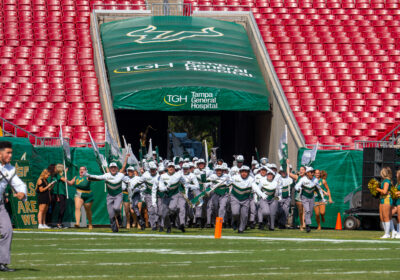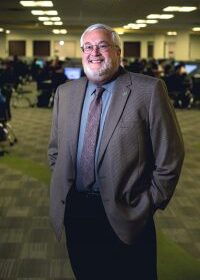Adjusting to life at USF after serving in Iraq
Like many military veteran students at USF, physics major Chris Watts has seen a lot. But one of the most important lessons hes learned, he said, is not to worry.
Theres always something good ahead of you, he said.
Watts was 14 when planes hit the World Trade Center on September 11, 2001. He spent high school watching news reports on the search for weapons of mass destruction and seeing colors change to indicate the daily level of terror. After high school, he was accepted to MIT and the Naval Academy.
Instead, he chose to join the Marine Corps and specialized in demolitions and explosions.
I wanted to work with NASA, he said. Still do. Thats why it seemed like a good choice to go the military route. I had no world experience. I was too naive to know what everything was about. I thought I agreed with the war.
Back in the states after two deployments and 13 months spent in Iraq, Watts said he faced constant stress, anxiety and sleepless nights.
One day I just broke down in this psychiatrists office at the VA, Watts said. I couldnt take it anymore. I got help for a while. But I really just missed the guys I served with. That doesnt go away.
What helped him the most, however, was maintaining contact with the members of his platoon.
Theres no one else who knows exactly what you went through, he said. The guys you serve with, they become your family.
Still, the intense memories of deployment remain, he said.
I remember the culture the most, Watts said. Its such a shock at first when you get there and expect to be really different from these people, but then you start talking to them and realize that theyre quite possibly the most genuine people on the planet. Theyre fighting us, but at the end of the day theyre just there to get a paycheck, same as we are. Theyre people trying to protect their homes and provide for their families.”
Watts was stationed in Ramandi, a city about 60 miles west of Baghdad in a fertile part of the country near the Euphrates River.
It used to be a major coalition base, Watts said. The Iraqis, the British Army everyone was stationed there. They called it Hurricane Point because every day there were mortars, rockets, sniper fire. They were constantly being bombarded.
Yet Watts said his times with his company were fulfilling, and he learned from his experiences.
I learned everything else as well, he says. You have to machine guns, mortars. But I never shot actively at people. It wasnt direct action, it was more counterinsurgency and counterintelligence. Hearts and minds thats what our focus was.
As Watts continues his education, he said there is still a chance of him being deployed again.
When things started up with Syria, I thought about what would happen if there was a recall and I had to go back, he said. I mean, thats not going to happen with Syria, but it might happen with Iran because they have tank weapons, and my specialty was tank weapons. The military is spread thin as it is, and I still have two years left before I officially part ways with them.
He said he reads the paper every day, so he knows what is going on in the world and knows what to expect.
But you cant waste your life worrying, you know? he said. Thats perhaps the most important lesson I learned in all of this. You have to appreciate life as it happens, and not waste time with all the what-ifs.






